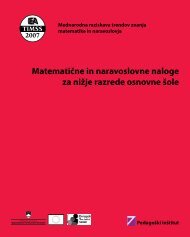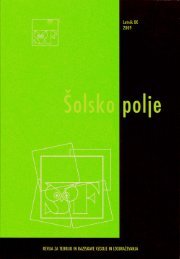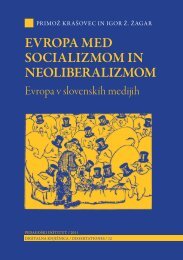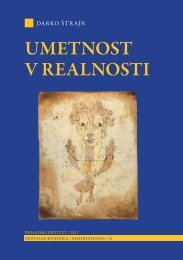84 ŠOLSKO POLJE LETNIK <strong>XX</strong> ŠTEVILKA 5/6F. Different reactions of politicians to Karadžić’s arrest;G. Karadžić’s biography;H. Protests against the Karadžić arrest;I. Death threats against the Serbian president, ministers, and journalistsfavouring Karadžić’s arrest.Overall, the expressed nostalgia infused the ways in which other themeswere represented, and it served as a kind of glue to connect the dominanttopics. Specifically, nostalgia here is put to use in a variety of ways.Firstly, the analysis has showed that the most prominent theme has beenKaradžić’s hidden life as a fugitive. 4 TS has focused on his life as DraganDabić, his new physical appearance, clothing, speech, psychological stateof mind, his alternative medicine interests, new love life, his shoppinghabits, his visiting of a »Crazy house« café, his writing for the alternativemedicine journal »Healthy life,« his Web page, public lectures on energetictherapy, and his Croatian holidays. In a way, Karadžić becomes a commercial-nationalistmedia product, a political commodity sold to audiences.The next most covered theme – also in quantitative terms – was devotedto a Serbian foreign policy towards the West, the European Union (the EU)and the International Community. Serbs have had a complex and traumaticrelationship with the West. The longevity of the wish to be European, Western,or, on the other hand, the desire to preserve Serbian authenticity inopposition to the West has been noted by many scholars (Popov, 2000). Forthe advocates of civil society, the West signifies the source of the politicaland economic reforms that Serbia should undergo. For others, it representsa neo-imperialist threat to the Serbian state and culture. In this model, theWest means either salvation or imperial domination. But for all who use it,»the West« remains a statement of future political intentions and a statementof national identity. Ironically, despite TS’s selective coverage of the arrest,it has represented the event as a point of departure for Serbia in its cooperationwith the West – for which Serbia should be rewarded with some concretesupport and investments from the EU. TS’s coverage further focusedon minor details of the arrest: the legal procedures, the political consequencesfor Serbia, and the reactions of Serbian elites and Karadžić’s family. TSemphasized the reactions of politicians to Karadžić’s arrest, especially therepresentatives of the EU, the USA, NATO, the UN, Republic Srbska, BH, Croatia,Monte Negro, Russia and the main Serbian political parties. Differentstatements from Karadžić’s close collaborators and »ordinary people« alikewere recorded, expressing emotional desire and nostalgia for Greater Ser-
JOURNALISTIC (RE)PRODUCTION OF HISTORY: TELEVIZED COVERAGE OF RADOVAN ...85bia. They similarly celebrated the fact that during the BH war Karadžić partlyrealized Serbian dreams for Greater Serbia.Moreover, the news reports speculated about how the trial in The Haguewill take place in detail, and envisioned a life in a prison cell in Scheveningenfor the once powerful and popular nationalist leader. The anticipatoryportrayals of Karadžić’s ignominious future is at the same time anostalgic one, insofar as nostalgia is often triggered by images of grandeurin ruin (Boym, 2001). The pathos of the ruin, in other words, takes shapeagainst the background of the splendour of the shadow of past glory castby the wreckage of the present. In our case, Karadžić as once-great leader indecline. The everyday protests, organized to support Karadžić, have playeda prominent role. The news programs also covered the death threats againstthe Serbian president, and some pro-European ministers, and journalists.Every day, TS repeated a short biography of Karadžić’s life.However, in order to recontextualize the analysis, it’s more importantto explore which chains of events were not represented (Fairclough, 2003).TS neglected to cover Karadžić’s war crimes although they are widely acknowledgedamong local and foreign scholars (e.g. Čolović, 2002; Popov,2000; MacDonald, 2002; Repe, 2008). The elision of history as a war criminalcan be seen as a distinctly nostalgic practice, since restorative nostalgiaclearly represents an idealized version of the past. When describing themain reasons for Karadžić’s arrest, TS did not cover the crime-against-humanitycharges of the Hague Tribunal against Karadžić. Instead, it focusedonly on the legal reasons for the arrest: »a significant step towards Serbia’sEU membership« (22 July 2008, TV News), »enormous pressures from theHague Tribunal and the EU« (24 July 2008, TV News) and »a Serbian ticketto finally enter European Union« (26 July 2008, TV News).The analyzed news items completely ignored, for example, the complextheme of Serbian responsibility for the delayed arrest of Karadžić.Many crucial questions were not addressed, such as, who actually knewabout Karadžić’s whereabouts, who was helping him, and why the arrestcame so late? Also, why does the current government refuse to offer accessto secret archives that could help to answer the above questions?Why has TS represented Karadžić’s arrest in such a thematically imbalancedway? TS adopted the same (nostalgic) nationalistic principles forthe construction of nationalistic discourses as in the past, i.e. refusal of acknowledgementafter the wars, a denial of responsibility and a repressionof memory (Broose, 2003; Milivojević, 2007; Milošević, 2008; Suša, 2005).Kammen’s description of nostalgia as »history without guilt« (1991: 6) is
- Page 3:
VSEBINA LETNIK XX ŠTEVILKA 5/6 Z
- Page 7 and 8:
UVODNA NOTICAIgor Ž. ŽagarTole pi
- Page 9 and 10:
ZA KAJ GRE V KAD - PREGLEDZGODOVINE
- Page 11 and 12:
ZA KAJ GRE V KAD - PREGLED ZGODOVIN
- Page 13:
ZA KAJ GRE V KAD - PREGLED ZGODOVIN
- Page 17 and 18:
ZA KAJ GRE V KAD - PREGLED ZGODOVIN
- Page 19 and 20:
ZA KAJ GRE V KAD - PREGLED ZGODOVIN
- Page 21 and 22:
ZA KAJ GRE V KAD - PREGLED ZGODOVIN
- Page 23 and 24:
ZA KAJ GRE V KAD - PREGLED ZGODOVIN
- Page 25 and 26:
ZA KAJ GRE V KAD - PREGLED ZGODOVIN
- Page 27 and 28:
DISKURZ: FOUCAULT, LACLAU TERZAPOPA
- Page 29 and 30:
DISKURZ: FOUCAULT, LACLAU TER ZAPOP
- Page 31 and 32:
DISKURZ: FOUCAULT, LACLAU TER ZAPOP
- Page 33 and 34:
DISKURZ: FOUCAULT, LACLAU TER ZAPOP
- Page 35 and 36: DISKURZ: FOUCAULT, LACLAU TER ZAPOP
- Page 37 and 38: DISKURZ: FOUCAULT, LACLAU TER ZAPOP
- Page 39 and 40: DISKURZ: FOUCAULT, LACLAU TER ZAPOP
- Page 41 and 42: DISKURZ: FOUCAULT, LACLAU TER ZAPOP
- Page 43 and 44: DISKURZ: FOUCAULT, LACLAU TER ZAPOP
- Page 45 and 46: DISKURZ: FOUCAULT, LACLAU TER ZAPOP
- Page 47 and 48: DISKURZ: FOUCAULT, LACLAU TER ZAPOP
- Page 49 and 50: TOPOI IN CRITICAL DISCOURSE ANALYSI
- Page 51 and 52: TOPOI IN CRITICAL DISCOURSE ANALYSI
- Page 53 and 54: TOPOI IN CRITICAL DISCOURSE ANALYSI
- Page 55 and 56: TOPOI IN CRITICAL DISCOURSE ANALYSI
- Page 57 and 58: TOPOI IN CRITICAL DISCOURSE ANALYSI
- Page 59 and 60: TOPOI IN CRITICAL DISCOURSE ANALYSI
- Page 61 and 62: TOPOI IN CRITICAL DISCOURSE ANALYSI
- Page 63 and 64: TOPOI IN CRITICAL DISCOURSE ANALYSI
- Page 65 and 66: TOPOI IN CRITICAL DISCOURSE ANALYSI
- Page 67 and 68: TOPOI IN CRITICAL DISCOURSE ANALYSI
- Page 69 and 70: TOPOI IN CRITICAL DISCOURSE ANALYSI
- Page 71 and 72: TOPOI IN CRITICAL DISCOURSE ANALYSI
- Page 73 and 74: TOPOI IN CRITICAL DISCOURSE ANALYSI
- Page 75 and 76: TOPOI IN CRITICAL DISCOURSE ANALYSI
- Page 77 and 78: University of Queensland, Centre fo
- Page 79 and 80: JOURNALISTIC (RE)PRODUCTION OF HIST
- Page 81 and 82: JOURNALISTIC (RE)PRODUCTION OF HIST
- Page 83 and 84: JOURNALISTIC (RE)PRODUCTION OF HIST
- Page 85: JOURNALISTIC (RE)PRODUCTION OF HIST
- Page 89 and 90: JOURNALISTIC (RE)PRODUCTION OF HIST
- Page 91 and 92: JOURNALISTIC (RE)PRODUCTION OF HIST
- Page 93 and 94: JOURNALISTIC (RE)PRODUCTION OF HIST
- Page 95 and 96: JOURNALISTIC (RE)PRODUCTION OF HIST
- Page 97 and 98: JOURNALISTIC (RE)PRODUCTION OF HIST
- Page 99 and 100: JOURNALISTIC (RE)PRODUCTION OF HIST
- Page 101 and 102: JOURNALISTIC (RE)PRODUCTION OF HIST
- Page 103 and 104: THE VOICE OF AN AGENDA-SETTINGAUTHO
- Page 105 and 106: THE VOICE OF AN AGENDA-SETTING AUTH
- Page 107 and 108: THE VOICE OF AN AGENDA-SETTING AUTH
- Page 109 and 110: THE VOICE OF AN AGENDA-SETTING AUTH
- Page 111 and 112: THE VOICE OF AN AGENDA-SETTING AUTH
- Page 113 and 114: THE VOICE OF AN AGENDA-SETTING AUTH
- Page 115 and 116: THE VOICE OF AN AGENDA-SETTING AUTH
- Page 117 and 118: THE VOICE OF AN AGENDA-SETTING AUTH
- Page 119 and 120: THE VOICE OF AN AGENDA-SETTING AUTH
- Page 121 and 122: THE VOICE OF AN AGENDA-SETTING AUTH
- Page 123 and 124: THE VOICE OF AN AGENDA-SETTING AUTH
- Page 125 and 126: THE VOICE OF AN AGENDA-SETTING AUTH
- Page 127 and 128: THE VOICE OF AN AGENDA-SETTING AUTH
- Page 129 and 130: THE VOICE OF AN AGENDA-SETTING AUTH
- Page 131 and 132: THE VOICE OF AN AGENDA-SETTING AUTH
- Page 133 and 134: THE VOICE OF AN AGENDA-SETTING AUTH
- Page 135 and 136: ‘68 KOT HKRATNA KRIZA EVROPSKEGAZ
- Page 137 and 138:
‘68 KOT HKRATNA KRIZA EVROPSKEGA
- Page 139 and 140:
‘68 KOT HKRATNA KRIZA EVROPSKEGA
- Page 141 and 142:
‘68 KOT HKRATNA KRIZA EVROPSKEGA
- Page 143 and 144:
‘68 KOT HKRATNA KRIZA EVROPSKEGA
- Page 145 and 146:
‘68 KOT HKRATNA KRIZA EVROPSKEGA
- Page 147 and 148:
‘68 KOT HKRATNA KRIZA EVROPSKEGA
- Page 149 and 150:
‘68 KOT HKRATNA KRIZA EVROPSKEGA
- Page 151 and 152:
‘68 KOT HKRATNA KRIZA EVROPSKEGA
- Page 153 and 154:
‘68 KOT HKRATNA KRIZA EVROPSKEGA
- Page 155 and 156:
‘68 KOT HKRATNA KRIZA EVROPSKEGA
- Page 157 and 158:
‘68 KOT HKRATNA KRIZA EVROPSKEGA
- Page 159 and 160:
POVZETKI/ABSTRACTSZA KAJ GRE V KAD
- Page 161 and 162:
POVZETKI / ABSTRACTS159NOVINARSKA (
- Page 163 and 164:
POVZETKI / ABSTRACTS161‘68 AS PAR
- Page 165 and 166:
AVTORJI/AUTHORSRuth WodakRuth Wodak
- Page 168 and 169:
166 ŠOLSKO POLJE LETNIK XX ŠTEV
- Page 170 and 171:
168 ŠOLSKO POLJE LETNIK XX ŠTEV
- Page 172:
ZAHVALARevija Šolsko polje izhaja
















